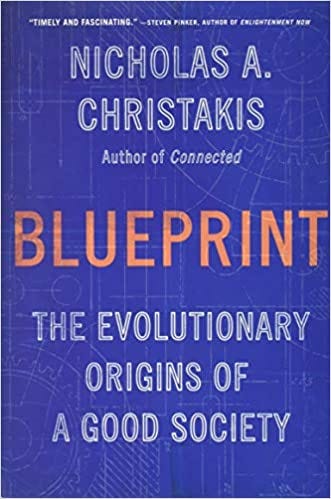I’m Luke Craven; this is another of my weekly explorations of how systems thinking and complexity can be used to drive real, transformative change in the public sector and beyond. The first issue explains what the newsletter is about; you can see all the issues here.
Hello, dear reader,
Recently, I’ve been reading Blueprint: The Evolutionary Origins of a Good Society by Nicholas Christakis. In this brilliant and humane book, Christakis tells a systemic story of evolution: one that seamlessly balances the conceptual chasm between the choices of individual people and the shaping of an entire society.
There is a lot to like about Blueprint but one passage in particular caught my eye. Christakis notes that while we find emotions hard to express in quantitative terms, they are nonetheless based in quantitative logics. He writes:
Emotions may serve as a kind of cognitive accounting of exchanges over longer-term interactions … We feel good about other people in proportion to how nice they are to us, and we keep balance sheets of those sentiments and remember past interactions. (pg. 231-2)
For me, this quote highlights a number of things about how we should think about the role of data in making sense of complex systems:
Qualitative judgements contain quantitative assessments. It is common to make a binary distinction between qualitative and quantitative judgements, but reality is more complicated that that. All quantitative judgements, in some way, rely on values and emotion. Values and emotions are, at least in part, built from complex processes of cognitive accounting based on proportionality. These forms of information are mutually reinforcing and cannot be meaningfully understood in isolation from each other. Yes, I really don’t like binaries.
Measurement is a multipurpose tool. There is a view held by many in the systems practice community that measurement is problematic when it is not used primarily to drive learning and improvement. That may be true in public sector contexts where accountability is the anchor for conversations about measurement, but it is not universally true for all contexts. It is entirely appropriate that in some situations, measurement should rely on snap, emotional judgements that rely on past experience and established balance sheets. Not all of those situations will result in a learning outcome and that’s OK. Measurement is a multipurpose tool.
Scale matters. The fundamental challenge of sense making is that complexity exists at multiple scales. Our experience of that complexity is not constrained to a particular scale at any one time—it cuts across and is independent of scalar hierarchy. In any large organisation, we are challenged to understand the complexity of the “whole” and the complexity of the parts. Those parts could be discrete organisational units or they could be individual people. Understanding each of those scales demands different types of data and analysis. The challenge is explaining what it means to experience those different scales simultaneously and the role that different forms of data play in the cognitive process of integration.
Measurement is messy and it is hard to classify. The question for practice is: what are the tacit processes of measurement and sense making that we need to learn to value throughout a policy and decision-making process? How do we understand measurement as a multipurpose, emotionally-loaded tool? How can we create the organisational and policy cultures of measurement that enable it to be used in this way? These might be hard questions to answer, but it is measurement that helps us muddle through.
By the way: This newsletter is hard to categorise and probably not for everyone—but if you know unconventional thinkers who might enjoy it, please share it with them.
Find me elsewhere on the web at www.lukecraven.com, on Twitter @LukeCraven, on LinkedIn here, or by email at <luke.k.craven@gmail.com>.





This makes me want to read this book even more. Thanks for the write-up. I talk a bit about the struggle with balancing researching individual behavior with aggregated behavioral data at Microsoft in this piece. It's easy to get caught up in the effects of scale when you're in the middle of it...and contributing to it! https://interplace.io/p/bill-and-brads-excellent-adventure